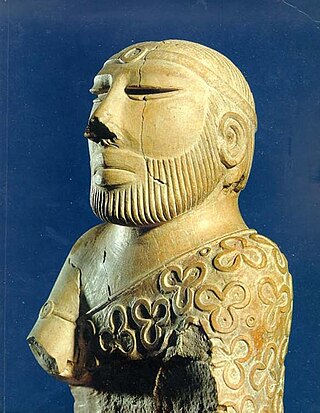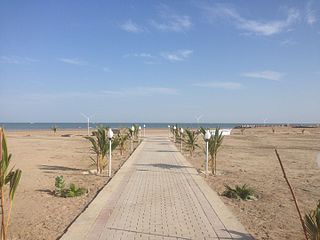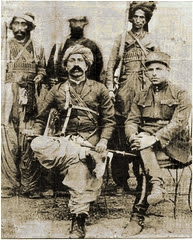This article relies largely or entirely on a single source .(June 2011) |
The 1898 Baloch uprising was a revolt that occurred in Balochistan, modern-day Pakistan. It was instigated by Sardar Mehrab Khan Gichki and Mir Baloch Khan Nousherwani.
This article relies largely or entirely on a single source .(June 2011) |
The 1898 Baloch uprising was a revolt that occurred in Balochistan, modern-day Pakistan. It was instigated by Sardar Mehrab Khan Gichki and Mir Baloch Khan Nousherwani.
Sardar Mehrab Khan Gichki started the revolt by attacking the Nazim, Diwan Udho Dass. He was then taken prisoner in the morning of 6 January. At the same time, the rebels, led by Mir Rustam Khan, launched an attack on the camp which resulted in loss of lives and a great portion of Government property. After the rebels took control of the Turbat fort, the Nazim had to sought refuge at Kalatuk. After the attack, Mehrab Khan communicated with his brother and some of the rebels moved towards the direction of the sea coast.
They looted Pasni, and destroyed the telegraph line between Pasni and Gwadar on the way. However, a column was despatched by Karachi under Colonel Mayne consisting of 400 Infantry and two guns. The rebels were defeated with heavy losses in action at the defile of Gokprosh. They were also defeated south of Turbat. Baloch Khan was killed along with about 150 others. The forts of Shahrak, Nag, Hor, and Sehr were subsequently demolished.
There appeared to have been five causes of the outbreak. Mir Baloch Khan, Nausherwani, who already held the surrounding country, had been granted the Bit fort in Buleda by the Khan of Kalat. However, it was occupied by Mir Azam Khan, Buledi, who held a sanad for its possession from the Khan and consequently refused to give it up, and the question was referred to the Agent to the Governor-General who decided it in favour of Mir Azum Khan, thus incensing Mir Baloch Khan against the Nazim who was considered responsible for the decision. [1]
Secondly, Mehrab Khan, Gichki, had long cherished resentment at Sir Robert Sandeman's action in nominating to the chieftainship of the Kech Gichkis, his elder brother, Sheh Umar, a man of much inferior capacity to himself. Innovations introduced by the Nazim into the system of levying revenue, his personal unpopularity among the Muslim people, and the general unrest which had extended all down the North-Western frontier during the previous year, were other factors in the situation. [1]
The rising led to arrangements for the introduction of a new form of administration. And at the end of the year, Mir Mehrulla Khan, Raisani, was sent to Makran as Nazim, where he has since continued to direct affairs (1905). [1]

Balochistan is a province of Pakistan. Located in the southwestern region of the country, Balochistan is the largest province of Pakistan by land area but is the least populated one. It is bordered by the Pakistani provinces of Khyber Pakhtunkhwa to the north-east, Punjab to the east and Sindh to the south-east; shares international borders with Iran to the west and Afghanistan to the north; and is bound by the Arabian Sea to the south. Balochistan is an extensive plateau of rough terrain divided into basins by ranges of sufficient heights and ruggedness. It has the world's largest deep sea port, the Port of Gwadar lying in the Arabian Sea.

Nawab Akbar Shahbaz Khan Bugti was a Pakistani politician and the Tumandar (head) of the Bugti tribe of Baloch people who served as the Minister of State for Interior and Governor of Balochistan Province in Pakistan. He also became minister of state for defence in the cabinet of Feroz Khan Noon. Earlier, he had also served as the Minister of State for Interior.

The history of Balochistan refers to the history of the Balochistan region of Pakistan, Iran and Afghanistan. Vague allusions to the region were found in Greek historical records of around 650 BCE. Prehistoric Balochistan dates to the Paleolithic.

Pasni, is a city and a fishing port in Gwadar District, Balochistan, Pakistan. It is located on the Makran coast on Arabian Sea about 450 km (280 mi) from Karachi. Administratively, Pasni is the headquarters of Pasni Tehsil, the sub-division of Gwadar District. Astola Island lies 40 km (25 mi) ESE of Pasni, in the Arabian Sea. The city of Pasni is itself administratively subdivided into two Union Councils.

Sibi is a district in the Balochistan province of Pakistan. The climate and topography of Sibi District is quite varied compared to the other districts of Balochistan. It is also known as the "hotspot" of Pakistan where the temperatures in the summer exceeded 52.6 °C (126.7 °F). Until 2002 the district had two sub-divisions, Sibi and Harnai, further organized into Tehsils and sub-tehsils: Sibi, Kutmandi and Sangan. Lehri was joined with Sibi district in 2002 and Harnai was made a separate district. Sibi tehsil is predominately inhabited by Pashtun tribes of Panni, Khajjaks and Tareens. Town of sibi is chiefly built upon lands of Marghazani and Dehpal.

Turbat is a city in southern Balochistan, Pakistan. It is the administrative centre of Kech District. Situated on the bank of the Kech River, Turbat was the historical capital of the State of Makran. Turbat is the second-largest city in Balochistan after Quetta and the 38th largest city of Pakistan. It is the largest city in the southern part of the province. The Gwadar Port lies 180 kilometres (110 mi) southwest of Turbat.
Sibi is a city situated in the Balochistan province of Pakistan. The city serves as the administrative headquarters of the district and tehsil of the same name.

The Khanate of Kalat was a Baloch Khanate that originated in the modern-day Kalat region of Balochistan. Formed in 1666 due to the threat of Mughal expansion in the region, it controlled the wider Balochistan at its greatest extent in the mid-18th century, extending from Kerman in the west to Sindh in the east and from Helmand River in the north to the Arabian Sea in the south. The Khanate of Kalat lost considerable area to Qajar Iran and the Emirate of Afghanistan in the early 19th century, and the city of Kalat was itself sacked by the British in 1839.
Mazari is a Baloch tribe in Pakistan. Mazari is derived from the Balochi word mazar, which means "Tiger" in the Balochi language. Rojhan-Mazari, a town in the Rajanpur District of the Punjab near the inter-provincial borders of Balochistan, Sindh and Punjab, is the stronghold of the Mazari tribe.

The Insurgency in Balochistan is an insurgency or revolt by Baloch separatist insurgents and various Islamist militant groups against the governments of Pakistan and Iran in the Balochistan region, which covers the Pakistani province of Balochistan, Iranian province of Sistan and Baluchestan, and Balochistan of southern Afghanistan. Rich in natural resources, this is the largest, least populated and least developed province in Pakistan and Iran, and armed groups demand greater control of the province's natural resources and political autonomy. Baloch separatists have attacked civilians from other ethnicities throughout the province. In the 2010s, attacks against the Shia community by sectarian groups—though not always directly related to the political struggle—have risen, contributing to tensions in Balochistan. In Pakistan, the ethnic separatist insurgency is low-scale but ongoing mainly in southern Balochistan, as well as sectarian and religiously motivated militancy concentrated mainly in northern and central Balochistan.

The Talpur dynasty is a Baloch dynasty that ruled the entire Sindh from the overthrowing of Kalhora dynasty in 1783 until British conquest of Sindh in 1843. A branch of the family continued to rule Khairpur, under British suzerainty and later as a Pakistani princely state, until 1955 when it was amalgamated into West Pakistan.
Lehri tribe is a Baloch tribe in Balochistan, Pakistan. They are descended from the Rind Baloch and have emerged from the Domki tribe.

Balochistan, also spelled Baluchistan or Baluchestan, is a historical region in Western and South Asia, located in the Iranian plateau's far southeast and bordering the Indian Plate and the Arabian Sea coastline. This arid region of desert and mountains is primarily populated by ethnic Baloch people.
The Anglo-Marri Wars is the name given to three major military conflicts between the Marri Baloch tribesmen and the British Empire in the independent eastern Baloch tribal belt. The conflicts took place in the 19th and 20th centuries, specifically in 1840, 1880, and 1917.
Paroom is a Tehsil in Panjgur District in Balochistan, Pakistan. The historical area of Parom was divided by the Goldsmith line, thus a small part of it falls in Iranian territory. According to local legend, it was also known as Gulshan, meaning 'rose garden'. The word parom means 'growth' in the Balochi language and is attributed to Parom due to its mild climate and the fertile soil which supports more than one crop per year. Today the region has two union councils, Parom and Koh Bun. The population numbers around 50,000 people.
Dil Murad Khan was a Baloch warrior who opposed British invasion in his area by revolting against them in 1857. Being a sardar of the Rind tribe he had a good support of his tribesmen plus that of other sardars of the area, namely Sardar Darya Khan Jakhrani and Syed Inayat Ali Shah.

Dost Mohammad Khan Baloch, also known as Mir Dost Muhammad Khan Baluch, was a ruler in Iranian (Western) Baluchistan from 1921 till 1928.
Gokprosh is a ridgeline of hills, part of the Coast Range of Baluchistan, Pakistan. The area is noted for being the site of engagements between the British and Baloch rebels in the 1898 Baloch uprising.

Mir Ahmad Yar Khan Ahmedzai (1902–1979), commonly referred to as Ahmad Yar Khan, was the last Khan of Kalat, a princely state in a subsidiary alliance with British India and the Dominion of Pakistan, serving from 10 September 1933 to 14 October 1955.
Mir Mehrab Khan Ahmadzai II was the khan from about 1817 to 1839 of the Capital of Capital Kalat, which is now part of the Balochistan Confederation of Balochistan